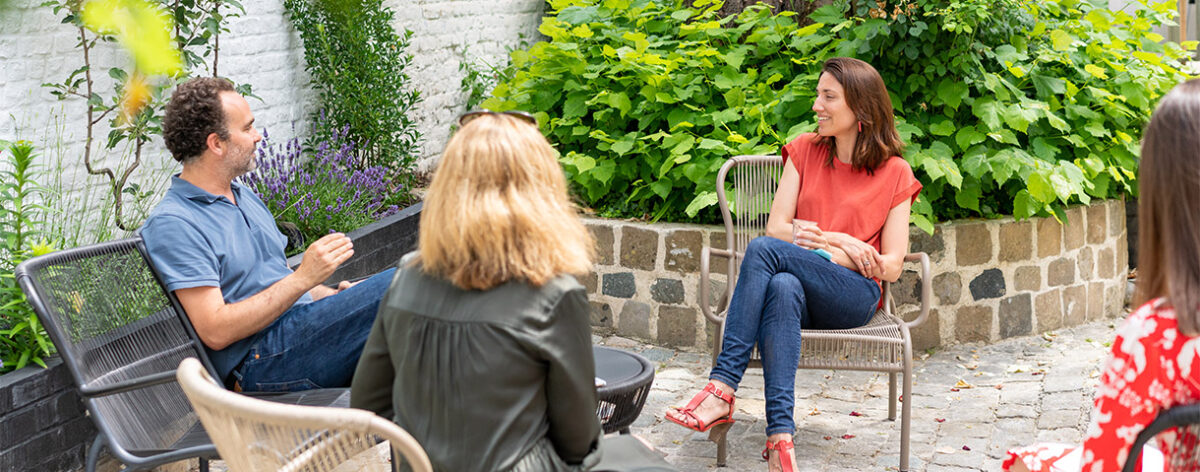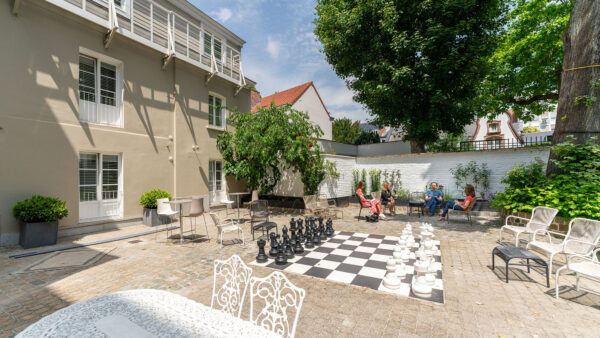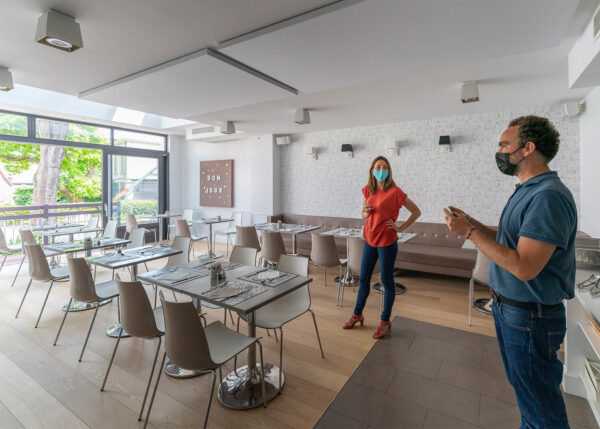
Interview with Martin Duchateau, founder of "Made in Louise"
March 2020. At a time where the tourism sector is close to being shut down, Martin decides to open up a second hotel. A bet as audacious as risky, but one that the entreprenor took up with flying colors, thanks to more than 20 years of experience in the hotel industry and to the Region’s support and subsidies.
“Innovation is the key”
What is your project/concept?
It’s a hospitality project, the field I’ve been passionate about for 20 years. The project is located in the city centre. It consists in the renovation of a restaurant and 19-room hotel on Place Marché aux Poissons. I opened a first establishment in the Louise district 10 years ago. It’s a boutique hotel with 48 rooms called Made in Louise.
What is your background?
I finished hotel school 20 years ago. I’ve always worked in hotels: 10 years for hotel chains, before going into my own business in independent hotels. I’ve travelled a lot in Asia and Europe for my work. I’ve been a tourism entrepreneur in Brussels, my hometown, for the past 12 years.
Do you manage things alone?
It’s primarily a family project. My family supports me for the design of the hotels and provides regular assistance for their operation. However, I manage things alone on a daily basis, which has both advantages and disadvantages. I can be much more responsive and decisions are taken more quickly with great autonomy. However, you aren’t challenged as much alone and creativity has its limits.
Why Brussels? Why is the capital a good place to get started?
Brussels is the city I was born in, and I really want to contribute to its name recognition and appeal. We live in a city that has a lot to give and receive in the hospitality world. Many actions are going in the right direction to ensure that Brussels is recognised as an entrepreneurial hub and a source of creativity thanks to its quality of life, geographical location, connections with other European capitals and its great diversity.
Did COVID impact your plans?
We were very hesitant about pursuing the project. However, we obtained funds from our financing partners. The hotel is scheduled to open in September 2022, which gives us time for the sector to recover.
If it does, what alternatives/solutions have you found to deal with it?
I’ve mainly rethought the overall project to test it in several crisis situations (health, climate, terrorism, etc.) to see which approach would be the most resilient and to prepare for the various scenarios as well as possible. Our behaviour, working and travel methods have all changed and we have to take that into account in our project. We need a much more hybrid, flexible and upgradable product. Although it’s all very theoretical, we’re facing a fairly significant number of unexpected situations and uncertainties at this time, which is making us vulnerable on a daily basis.

What role does tourism have to play in the recovery?
Tourism has a significant impact on a number of sectors. Customers travelling for both pleasure and professional reasons spend and consume in a number of different establishments (museums, visits, transport, hospitality, events, etc.). It’s a sector with global impact. Meetings and conventions have to come back as quickly as possible.
Does the sector have to reinvent itself?
We were heavily impacted by the crisis, like all sectors, and we have to revisit the way we function and operate. We have to identify the changes that must or will take place. Is this the end of mass tourism? Will people travel differently? More locally? Make more purposeful trips? Will we still need to meet, or meet in a completely different way? There are many questions and, in any event, we’re all looking for the most resilient concepts to lessen the shocks and recover as quickly as possible.
Do hospitality and innovation go hand-in-hand?
Clearly. Innovation is key. It’s thanks to innovation that we can be more competitive, more resilient and, especially, improve the customer experience. The personalisation of hospitality increasingly requires innovative solutions. Hospitality is a very important sector which brings together many different activities. Digitalisation helped all of us during the crisis: some of the solutions will remain and others will disappear. We’re trying to find the right balance between “people”, the heart of our business, and “machines” that help us be more productive.
Is it possible to be profitable and circular in the hospitality industry? What have you implemented for your establishment(s)?
Yes, it is possible, but we still have a long way to go. We’re already working with local companies for our breakfasts and our drinks offering. However, there is often an economic reality which prevents us from going further. There is also a logistics challenge: things are still very decentralised. I really believe that there is demand on the part of our customers and our employees to move towards more sustainable and circular projects. For the good of our sector, we have to work together to get there.
Which services did you benefit from at hub.brussels? How did they help, stimulate, inspire you?
I’ve known about hub’s services for several years now. Since the creation of the hospitality cluster, they make even more sense, and we belong to a very valuable network of entrepreneurs.
I’ve used several of the services ranging from advice to requests for connections. It’s been very productive every time and has really helped me along the way.

Do you, like Martin, want to start or develop a business? Discover our services!
Les coachs de hub.brussels suivent votre projet commercial, de l'idée à la concrétisation.
Concrétisez vos projets de commerce/Horeca en 6 jours gâce à notre ...